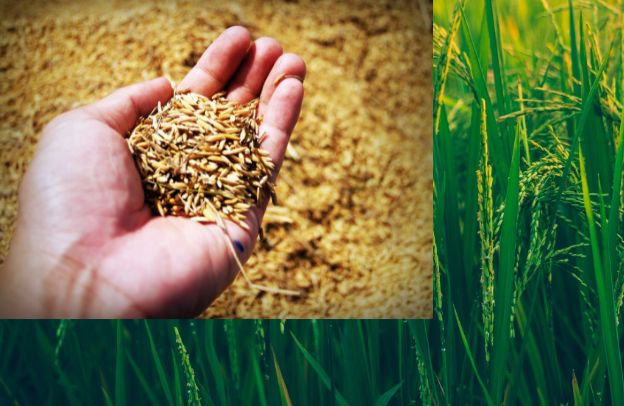Enhancing Rice Production in Africa: Unlocking Agribusiness Success through Research, Collaboration, and Storytelling

The clanging of a rice mill, the laughter of children by a paddy field, and the determination etched into farmers’ faces as they till the land are sights that make Africa’s agricultural landscape a vivid testament to resilience and potential. For African diaspora entrepreneurs yearning to tap into the continent’s agribusiness opportunities, the journey promises more than just profit margins.
Want to learn more about storytelling? Start by downloading the first chapter of The Storytelling Mastery.
It is a chance to feed nations, drive economic progress, and create a legacy of empowerment for generations. But for this dream to become a reality, effective strategies, deep-rooted collaboration, and continuous learning are non-negotiable.
The Current State of Rice Production in Nigeria
Let’s start with a reality check. Despite its economic importance, rice production in Nigeria faces significant hurdles that could easily discourage investors. You will find small and medium-scale farmers struggling with inadequate infrastructure: poor roads turn the distribution into a logistical nightmare, and irrigation systems often resemble relics from a forgotten era.
Post-harvest losses remain alarmingly high due to subpar storage facilities, robbing farmers of their hard-earned gains. Beyond these physical barriers, there is a lack of access to high-quality seeds, fertilizers, and cutting-edge agricultural techniques, all of which are essential for maximizing yield and reducing operational costs.
Compounding these issues is climate change, which manifests in unpredictable droughts, floods, and other extreme weather events that derail planting and harvesting cycles. This stark reality underscores the need for robust research and development (R&D).
In an article by the Food and Agriculture Organization titled ”Rice Production in Africa: Current Situation and Issues,” it is emphasized that rice is a crucial staple food in many African countries and forms a significant part of the diet in numerous others.
Over the past 30 years, demand for rice has consistently increased, underlining its importance in the strategic food security policies of many nations. However, with only a few exceptions where countries have achieved self-sufficiency, the demand for rice in Africa outpaces domestic production, resulting in substantial imports that drain foreign exchange reserves.
According to FAO data from 1996, Africa consumes about 11.6 million tonnes of milled rice annually, with approximately 3.3 million tonnes (33.6 percent) imported.
Notably, 21 out of 39 rice-producing countries in Africa import between 50 to 99 percent of their rice needs, with the North and Central African regions showing significant disparity—ranging from just 1.7 percent to as high as 71.7 percent in imports, respectively.
The continent’s struggle to achieve rice self-sufficiency stems from various critical challenges within the rice industry. Addressing these challenges is essential to reduce the heavy dependence on rice imports and to harness the underutilized potential of local production resources to meet the rising demand.
As diaspora entrepreneurs, you have the opportunity to channel your resources and expertise into solutions that bridge these gaps, transforming agribusiness into a sustainable, profitable venture.
See also Access to Finance for Small and Medium-Scale Farmers in Nigeria: Opportunities and Limitations
Leveraging Research and Development (R&D) for Agribusiness Growth
You might be wondering: How exactly does R&D drive agribusiness transformation? Imagine a scenario where farmers cultivate rice varieties resistant to both pests and floods, where every seed planted holds the potential for a bountiful harvest despite adverse conditions. This isn’t a utopian dream but a tangible outcome of agricultural research.
High-yielding and climate-resilient rice varieties: R&D enables the development of rice breeds that thrive in diverse agroecological zones across Nigeria and beyond. The International Rice Research Institute (IRRI) and AfricaRice are two organizations that have championed the creation of such varieties, resulting in increased productivity and resilience in agricultural practices.
Through precision farming technologies like drones and satellite imagery, farmers can map their fields, optimize irrigation, and reduce wastage. The integration of modern soil management and pest control methods has also proven effective, drastically improving yields.
In an article published on ResearchGate titled ”Rice Pest Management Using Modern Techniques and Novel Approaches,” it is highlighted that rice, as the staple food crop in Asia, plays a critical role in sustaining the growing population.
However, pest infestations remain a significant challenge, causing increasing and more complex damage to rice farming. To address this issue, innovative pest management strategies are being developed and adopted.
The article explores recent advancements in pest management and their potential to enhance future rice production. Key innovations include host plant resistance techniques such as RNA interference (RNAi) and genome editing, as well as the application of nanotechnology.
It also delves into advances in biological control, the use of natural chemicals, and info-chemical-based pest management systems. These approaches represent a promising future for sustainable rice farming, aiming to mitigate pest-related losses while ensuring increased productivity to meet rising global demand.
As an entrepreneur, your role goes beyond financing projects; you have a front-row seat to these groundbreaking advancements. By supporting R&D initiatives and collaborating with local institutions, you can drive innovation tailored to Africa’s specific needs.
Collaboration: A Pillar for Growth
Collaboration within the global African diaspora is more than just a buzzword; it is a necessity. Picture this: African diaspora entrepreneurs, researchers, policymakers, and smallholder farmers coming together to shape a prosperous rice industry. The collective knowledge and experience from different continents can create a ripple effect of innovation and economic transformation.
Here’s how you can foster meaningful collaboration:
- Partnerships with Local Institutions: Collaborate with universities, research centers, and agricultural organizations within Africa to develop solutions tailored to the unique challenges faced by farmers. By working with local experts and academia, you can tailor initiatives that consider regional climates, soil types, and socio-economic factors, ensuring that strategies are both practical and sustainable. Joint research projects and pilot programs can pave the way for breakthroughs that directly benefit smallholder farmers.
- Community-based Extension Services: Work closely with extension officers who act as the bridge between research institutions and farmers. By equipping them with tools, training, and resources, you ensure that new technologies are effectively disseminated at the grassroots level. These officers are vital for translating complex information into actionable steps, fostering trust, and ensuring that innovations take root in local farming practices. Creating mobile training units or digital platforms for continuous learning can enhance the reach and impact of extension services.
- Networking Platforms: Create forums, workshops, and networking events that connect diaspora investors with local stakeholders. Sharing success stories, failures, and best practices builds trust and accelerates learning. Virtual conferences, cross-continental collaborations, and knowledge-sharing hubs can bridge geographical gaps and encourage synergistic partnerships. By highlighting the collective achievements of the diaspora, you inspire a unified approach to tackling challenges and seizing opportunities.
- Mentorship Programs: Set up mentorship programs where experienced entrepreneurs and industry leaders from the diaspora can guide local farmers and emerging agribusinesses. These programs can cover aspects like strategic business planning, market access, and sustainable farming practices. By sharing insights and experiences, mentorship cultivates a culture of innovation and growth.
- Investment and Funding Networks: Create investment syndicates or funds that pool resources from the diaspora to support agribusiness ventures in Africa. This can range from providing capital for new technologies to funding sustainable infrastructure projects. By creating a transparent system for investment, you attract more diaspora participants and empower local communities.
- Cultural and Knowledge Exchange Initiatives: Promote programs that celebrate the diverse cultures within the diaspora and their contributions to agriculture. These initiatives can include cultural exchange events, collaborative art and storytelling projects, or cross-border research expeditions that blend traditional farming wisdom with modern techniques. This can enhance cultural understanding and inspire unique solutions that are deeply rooted in community traditions.
By embracing these strategies, the African diaspora can harness its collective strength and contribute to building a thriving, resilient, and future-proof rice industry. The power of collaboration lies in recognizing that when people unite across borders, they create an ecosystem that can overcome obstacles, drive progress, and transform agricultural landscapes for generations to come.
Successful R&D Programs in Africa
Take a moment to reflect on the African Rice Initiative (ARI). This pan-African program focuses on developing high-yielding, climate-resilient rice varieties, and has empowered countless farmers with new tools and techniques.
Similarly, Tanzania’s Rice Sector Development Program (RSDP) transformed the country’s rice production landscape by improving seed distribution, constructing modern irrigation systems, and establishing rice processing facilities.
What apart? Strong government backing, active collaboration among researchers, and the involvement of farmers from inception to execution. The takeaway here is simple: sustainable success in agribusiness demands a coordinated effort.
Using Storytelling for Agribusiness Success
You know the saying: “Facts tell, stories sell.” Storytelling is a powerful tool that transforms your agribusiness venture into a narrative worth sharing. Every farmer’s triumph, every community uplifted through increased yield, and every innovative technique pioneered is a story waiting to be told.
By leveraging storytelling, you humanize your brand, connect emotionally with your audience, and differentiate yourself in a crowded market.
Consider this: When you share the journey of a farmer who turned a failing crop into a record yield through hard work and innovative practices, you’re not just sharing a success story, you are sharing resilience, hope, and the power of sustainable solutions. These stories don’t just attract attention; they build trust and inspire action. Consumers want to know where their food comes from and who is behind it. By weaving in the personal and community impact of your agribusiness, you make your brand relatable and memorable.
Storytelling also opens the door to partnerships and collaborations. NGOs, investors, and other stakeholders are drawn to businesses with a clear narrative of impact. This creates opportunities for funding, joint ventures, and strategic alliances that can take your business to the next level.
Your story has the power to turn ordinary products into extraordinary experiences that resonate with people on a deeper level, turning customers into advocates and building a loyal customer base that sees value beyond the price tag.
Additionally, storytelling is not limited to traditional platforms. Social media, blogs, video series, and podcasts offer dynamic ways to showcase your narrative. By telling your story consistently and authentically, you position yourself as a leader and innovator in your industry, driving change and inspiring others to be part of the journey.
See also Leveraging Heritage Storytelling for Agribusiness Branding
Consider these storytelling strategies:
- Personalizing your journey: Share your challenges, breakthroughs, and vision as an agribusiness entrepreneur. Let people see the heart behind the business. This authentic touch creates a relatable narrative that builds trust and fosters a deeper connection with your audience.
- Highlighting R&D impact: Share how new technologies and resilient seeds transformed entire communities, providing tangible benefits and better livelihoods. Include stories of farmers who overcame adversity due to these innovations, demonstrating the real-life value of research and development.
- Engaging through digital platforms: Use social media, blogs, and videos to reach a global audience, attract investment, and build consumer loyalty. Interactive content such as live Q&A sessions, behind-the-scenes looks, and educational webinars can amplify your message and create opportunities for direct engagement.
- Sharing Collaborative Success Stories: Spotlight partnerships with other businesses, NGOs, and government initiatives that have led to impactful projects. Showcasing teamwork demonstrates that progress in agribusiness isn’t just an individual effort but a collective mission.
- Integrating Visuals: Incorporate high-quality images and infographics to visually support your stories. Photos of thriving farms, community events, and the people behind the production make your story more immersive and memorable.
- Focusing on Future Visions: Paint a picture of where you and your community aim to go next. Share the goals and aspirations that drive your work, inspiring others to join your journey and contribute to positive change.
Practical Tips for African Diaspora Entrepreneurs in Agribusiness
- Invest in continuous learning: Agribusiness is evolving, and staying relevant requires constant upskilling. Programs like AClasses Academy offer business and self-improvement courses designed to equip you with the skills necessary for success.
- Identify and access funding opportunities: Collaborate with international development partners and explore grants, loans, and subsidies targeted at agricultural ventures.
- Understand the regulatory landscape: Engage with local governments to navigate policies, import/export restrictions, and tax incentives.
- Prioritize social impact: Aim for more than just profit to make a tangible impact on the lives of smallholder farmers by improving their access to technology and resources.
- Utilize data and market insights: Adopt data-driven decision-making to optimize production, anticipate demand, and target specific markets effectively.
Check this: The Entrepreneurial Spirit of Nigerians Abroad – A Conversation with Akinola Muiz, Verona, Italy
Conclusion: Building the Future Together
The journey to enhance rice production in Nigeria and across Africa isn’t without its hurdles, but it’s a journey worth taking. As a diaspora entrepreneur, you possess the power to drive change by leveraging R&D, fostering collaboration, and using storytelling as your secret weapon. Remember: progress thrives when we learn, innovate, and build together.
Collaboration isn’t just about pooling resources, but it is about building a community driven by a shared vision.
See also Growing Together: Building Community Through Collaborative Agribusiness Storytelling
When you invest in Africa’s agribusiness potential, you aren’t just cultivating crops; you’re cultivating a legacy that feeds nations, empowers communities, and opens doors for future generations.
Are you ready to take the first step? Your story is just beginning. Write it with purpose, passion, and a commitment to making a lasting difference. The world is waiting.
Want to learn more about storytelling? Start by downloading the first chapter of The Storytelling Mastery.





